Chapter 11
END OF THE RAINBOW

I had to spend my first week or so in Hawaii in the confines of the U.S. Quarantine Hospital in Honolulu. Mr. Hall assured me that my confinement would not be very long. As I felt no incapacitating ailment and as I was, after all, in the land of my hopes, my quarantine period was not so depressing; and it passed soon enough.
One day while in the Quarantine Hospital, I was called by one of the attendants and told that I had some visitors outside. I went out and there was Mr. Hall with his family: Mrs. Hall and their two daughters. I fell in love with those good people at once. I was told that Moto, the chauffeur, would come and get me when I was discharged in a few days. And, so, I met my new family in this new country. I had finally found the end of the rainbow that I had so desperately searched for.
When it was time for my discharge, Moto came and drove me home. What met my eyes was a great surprise. The Hall home was on top of a hill overlooking Honolulu near Nuano Valley. It was the most beautiful home I had ever seen: a large ranch type with four bedrooms and two bathrooms, great dining and living rooms. And what a kitchen!
They had a three car garage. In the back of the garage was the guest room, the girls' rumpus room, and the servants' quarters. They assigned me to the guest room, the best place I had lived in all my life. I felt like a Boy Cinderella.
In three days I was enrolled at the McKinley High School. I told Mrs. Hall I would like to have some duties so that I could work after school. The Japanese couple did all the housework except for the laundry. Twice a week a laundry woman came in and did the washing and ironing. When I told Mrs. Hall I could do this work, I was tried. I passed the test with flying colors. There was nothing to washing the clothes because I used the washing machine; and my ironing was excellent. This became my chore.
My first encounter with Cato, Moto's wife, who was the housekeeper and cook, instinctively told me that she would be a second Mrs. Hall. It was not because we were both Oriental, for I found out soon enough that Hawaii had the least race conscious people. But, it was because even though there were thousands of Filipinos living in Honolulu, Mr. Hall had picked me from thousands of miles away and brought me home to educate. This, I believed, made me someone special in their eyes.
During the time I lived with this Japanese couple, I learned to love them, too, for they treated me like a younger brother. I offered to help Cato wait on the family at supper on days when there was no school. She was glad to let me do this if Mrs. Hall would agree. Which she did. So I learned the correct way to serve a table.
Mrs. Hall treated me better than any of my relatives in the Philippines had. The son, Donald, was at college the four years I lived in Hawaii and we had very little contact. Catherine, 17, and Ellen, 14, were both studying at Punahou School, a prestigious private school in Honolulu. All of them took me in as a member of the family.
A month or two after my arrival, Mr. Hall celebrated his fiftieth birthday and there was a family gathering at their house. I found out that he was a Mason and a Rotarian. In 1924 or 1925 he was the president of the Honolulu Rotary Club.
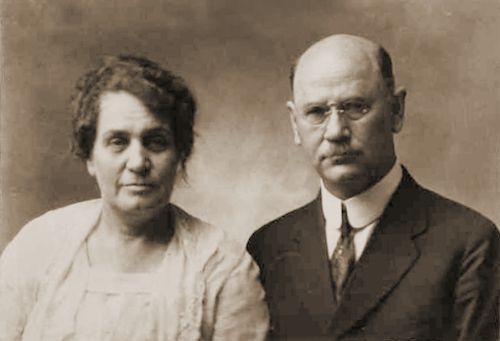
Alice Templeton Hall and her husband William G. Hall, 1921.
I was given an allowance during the first month, but I spent very little of it. If I still had money on Mondays when Mrs. Hall gave me the allowance, I declined to take any more telling her that I had not spent all the money she had given me. This act of frugality further endeared me to this fine lady.
Even though there were thousands of Filipinos in Honolulu, I never became acquainted with any of them during the time I was living with the Halls. They took me with them to the theater and I attended their church. On week ends, when the family went to their beach home, I went with them.
Before the end of the school year, I was converted to their church and I was baptized in the First Christian Church of Honolulu. I was doing great in school and making good grades. In fact, I was doing better than the girls. Everything was going good with me.
I must have been born under the most unlucky of signs. Just when everything looked bright and promising, obstacles and roadblocks of major proportions seemed to always bar my path. A person of less ambition and determination would have thrown in the proverbial towel and called it quits, but I did not. I just took it as part of my testing. I felt sure God had a plan for me.
A few weeks before the opening of the 1924-25 school year, I became ill. I had a high temperature and a cough which Mrs. Hall and I thought was just an ordinary cold. But the coughing persisted and one morning I spit blood.
I knew what this meant. I had seen many of my relatives spit blood. We would, at once, attribute it to TB. I told this to Mrs. Hall and she sent me immediately to their family doctor. When the doctor got through with his examination, he did not prescribe any medication but told me to go home and he would call Mrs. Hall. I felt then that something must be seriously wrong.
Mrs. Hall had heard from the doctor before I returned home. She met me at the door and the look on her face said it all, even before she told me the bad news. The fear that had been torturing me since I had found blood in my sputum made me numb. I had tuberculosis and I must enter the Leahi Hospital Home for TB patients. Mrs. Hall tried to cheer me up by saying that I was lucky that it was discovered early, still in the early stages. Arrangements for my confinement at Leahi Home were made that same day; and that afternoon I left home with Moto and Mrs. Hall for the hospital.
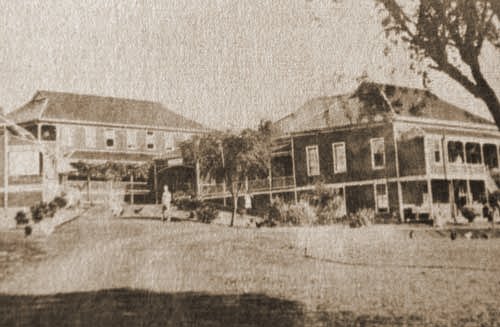
Leahi Hospital Home for TB patients in 1904.
I was not aware of how seriously ill I was. I gained weight and, from all outside appearances, I was a well person, but the x-rays did not lie. I spent my eighteenth birthday at Leahi Home. 1925 came, then 1926, and I was still hospitalized.
Two weeks before the opening of school, I heard the good news. I was to be discharged. I went back home with the Halls. When school opened, I did not return to McKinley High. Mr. Hall entered me in the Mid Pacific Institute, a private boarding school at the edge of beautiful Nuanu Valley. I do not know how much it cost Mr. Hall to have me in the Leahi Home, but I am sure it cost him a lot. Now, he was enrolling me in a private boarding school. How generous and kind he was!
Being past eighteen, I was on the verge of asking him to let me find a job and be on my own. But I felt that I must obey his wishes; and so I was again pursuing my education. But not for long.
Just before Christmas, I became sick while in school. The doctor diagnosed my illness as a relapse of my old sickness, TB. To Leahi Home I went again.
During my second confinement in the sanitarium, I got acquainted with a couple of patients in my ward who belonged to the Reorganized Church of Jesus Christ Latter Day Saints, the Mormons of the original founder Joseph Smith. The Bishop who visited them regularly got me interested in their tenet and teaching. Before long, I was converted to this faith and was baptized in the Mormon Church.
It was during this second confinement that Cousin Melicia mentioned in one of her letters that my Godfather, her brother Roman, resided in New Orleans with his family. She also sent me his address. I wrote to Roman and this started a regular correspondence between us.
Just before Christmas in 1926, I received a large package containing clothes from Roman. I mentioned this to Mr. and Mrs. Hall and told them that when I was discharged from the sanitarium, I would like to go to New Orleans to join my Godfather and look for work there.
The Halls acceded to my request and said if that was what I wanted they would give me the money for the trip. I told them I would rather try earning my passage money to New Orleans, as they had already spent so much on me.
In January 1927, Mr. Hall left for his periodic business trip to Manila taking Mrs. Hall with him. Donald was still at MIT in Boston and Catherine was in college in Los Angeles. Ellen was left at home with the Moto's. My monthly x-ray check up was done and I was pronounced well again. I could go home. I called Moto and gave him the good news that I was well enough to go home. He came to pick me up and, so, late in January 1927, I left the Leahi home for the last time.
The Moto's knew of my decision to look for work and to go to New Orleans and be on my own. They were very sympathetic and offered me money. The Halls had left word that I could stay in their house as long as I wished.
Because of my experience in domestic work, I thought of going into hotel work and I started job hunting at once. My first trip was a success. I don't think I had been gone an hour, when I was hired as a busboy at the Royal Hawaiian Hotel, the most modern and most prestigious hotel in Honolulu.
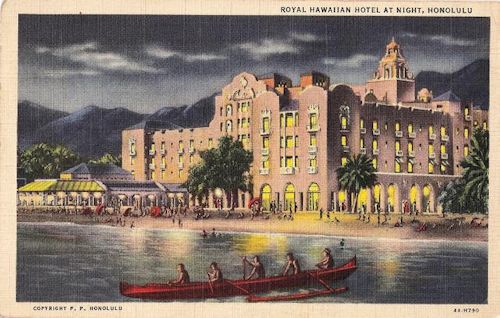
Royal Hawaiian Hotel, Honolulu.
Most of the employees, except for the cooks, the housekeepers, and the staff were Oriental: Japanese, Filipinos, Chinese, and Koreans. I was past twenty and my stay at the sanitarium had made me a picture of good health. The fact that I had attended McKinley High School and the Mid Pacific Institute, even though for short periods, helped me in obtaining this job.
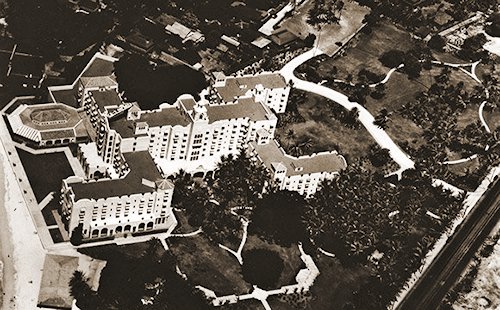
Royal Hawaiian Hotel, Honolulu.
I adjusted immediately to my new job and before long I was promoted to waiter. The employees of this hotel were provided with living quarters in a compound of small cottages near the hotel. I was able to save most of my earnings and tips. We were paid only fifty dollars a month, but we made good tips.
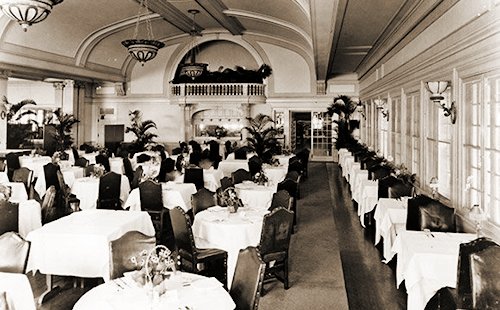
Royal Hawaiian Hotel Dining Room, Honolulu.
Being a waiter at the "Royal" gave Filipino workers in Honolulu a sense of pride as the workers on the sugar plantations made only a dollar a day. At that time, fifty dollars a month with room and board was good wages even without tips.
By the end of summer, I had saved enough money for my trip to New Orleans. I had a very sad parting with the Halls. Parting with them was as sad as parting with my own loved ones in the Philippines. I told Mr. Hall that I could never repay him for his kindness and benevolence in taking me, a poor orphan, and offering me the best he had. He told me to be a good man and not do anything that I would be ashamed to tell him: that would be enough payment for him. What a wonderful person! It was difficult to leave that family.
Continue to next chapter...

(Introduction)
(Contents)
(Chap 1)
(Chap 2)
(Chap 3)
(Chap 4)
(Chap 5)
(Chap 6)
(Chap 7)
(Chap 8)
(Chap 9)
(Chap 10)
(Chap 11)
(Chap 12)
(Chap 13)
(Chap 14)
(Chap 15)
(Chap 16)
(Chap 17)
(Chap 18)
(Chap 19)
(Chap 20)
(Chap 21)
(Chap 22)
(Chap 23)
(Chap 24)
(Chap 25)
(Chap 26)
(Chap 27)
(Chap 28)

|